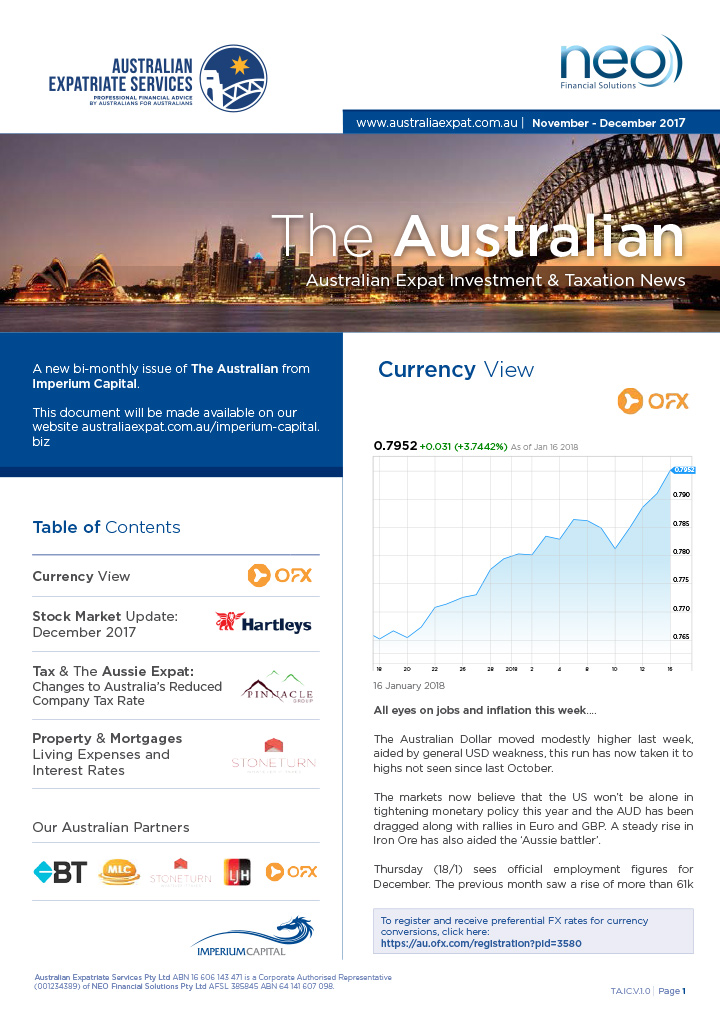Currency View by OFX


Last week’s news
- Business activity in the eurozone remained unexpectedly weak in January, as the latest PMI results showed a decline in the services sector was just about offset by a recovery in the manufacturers PMI. Furthermore, German activity rose above expectations but was also offset by weak data out of France which has been hit by nationwide strikes for several weeks. All PMI data did come in over 50 meaning there has been growth, but much less than anticipated. The Eurozone economy has been slowing sharply over recent months and the ECB now forecast growth last year would be 1.2%, down from previous estimates of 1.8%. The U.S-China trade war has had a rippling effect on Europe and furthermore the US continues to threaten to impose extra tariffs on European goods in retaliation for a tax on U.S technology companies. This means Europe could be the next frontline in the battle over trade.
- The downturn in global trade continued to decline in November last year, marking the longest period of contraction since the end of the 2008 financial crisis. The volume of goods trade dropped 0.6% month on month and was down 1.1% on November 2018. The annual contraction in trade- which is the value of exports and imports adjusted for price changes- showed continuous slowdowns in all continents. Economists expect trade data to improve in early 2020, reflecting the signing of the US-China phase one deal earlier this month, as we as improving conditions in emerging markets such as Turkey although a strong recovery is not forecast.
- The UK private sector activity improved more than expected in January thanks to some solid growth in the UK services sector. The UK services and manufacturing PMI figures posted last week rose to 52.4 in January from 49.3 in December. The latest figures have poured doubt on whether the Bank of England will cut interest rates this week. A rate cut was almost priced in around 50/50 prior to the PMI results however the uptick in the UK’s strongest sectors could be the catalyst to keep rates on hold for the time being.
- The Bank of Canada (BoC) through its chairman, Stephen Poloz, left the open door for a rate cut. The BoC statement basically said that the 1.75% interest rate is appropriate for the current economic conditions. However, Poloz sees some risk of downside inflation, which pushed the Loonie to a new low since December 25, 2019 against the Greenback of 0.7592 (USD/CAD high of 1.3172). Poloz added, “I’m not saying that the door is not open to an interest rate cut, obviously it is, it is open,” confirming that the Canadian economy will have “excess capacity,” which puts negative pressure on inflation and economic growth.
- The ECB left its deposit facility rate at -0.5 percent, as expected. The Euro initially spiked, and it had reached 1.1108 initially right after Lagarde opened her press conference, but then captured many buyers on the back foot, when Lagarde refused to reveal her preference for an inflation strategy and pointed to a moderate increase in inflation, the Euro quickly lowered.
Looking ahead
- Christine Lagarde’s economic outlook did not change, leaving market participants wondering what is next for the Euro Zone. At the same time, the ECB launched its long-awaited strategic review to assess the formulation of price stability, but market participants will have to wait until at least until the end of 2020 to know about the objectives of this strategic review; and it was obvious when Lagarde said that “It is over when it is over”, sending the Euro lower. The review is anticipated to contain information such as whether inflation will be considered as a simple target. The uncertainty of this strategic review weighted on the Euro crosses. The question is if it will continue to push the Euro lower over the next few days having the Fed monetary policy release in the U.S. next Wednesday.
- A risk that market participants are not talking about is the implications of the coronavirus on China, Asian currencies, as well as proxy currencies such as the Aussie dollar and other commodity currencies. The USD/CNH pair could especially be pressured to the upside (with the CNH going lower). Last Saturday, Chinese president Xi Jinping already expressed public worries about the risk of an accelerated spread of the illness. Cases have been reported in more than 11 countries so far and counting. The Japanese Yen, the most popular “safe haven” currency, already increased versus the Aussie dollar, the Euro, and the U.S dollar by 1.54, 1.39 and 0.78 percent respectively last week.
- Business confidence, through the U.K Manufacturing PMI, has improved sharply in the U.K. and has risen to 49.8, which is the highest level since May 2019. Additionally, market sentiment has improved since the election last December, when the government committed to boosting private spending and economic growth. Even a rate cut would not be able to create losses in the Pound due to the positive “carry trade” that it has in comparison with the Euro, which has a negative short-term rate. This is reflected in the EUR/GBP pair trend, which has traded from a high of 0.9325 in August 2018 to a low of 0.8276 last December. Next week, the BoE is releasing its monetary policy and it might confirm whether its current rate, which has not changed since August 2018, will stay at 0.75%.
Key market events this week
- US Durable Goods Orders (Dec) – Tuesday
- US Consumer Confidence Index (Jan) – Tuesday
- AUD Consumer Price Index YoY (Q4) – Wednesday
- Fed Interest Rate Decision plus press conference – Wednesday
- German Unemployment Rate and Change (Jan) – Thursday
- Bank of England Interest Rate Decision plus press conference – Thursday
- US Gross Domestic Product Annualised QoQ (Q4) – Thursday
- CNY Manufacturing PMI (Jan) – Friday
- Euro-Zone Consumer Price Index Core YoY (Jan) – Friday
- Euro-Zone Gross Domestic Product YoY (Q4) – Friday
- USD PCE Core YoY (Dec) – Friday
Disclaimer
Note that specialist Accounting, Property, Mortgage and Foreign exchange services offered by our partners, Stoneturn, OFX, Hartley’s and LJ Hooker are via referral arrangement only. Australian Expatriate Services are not responsible for any advice/services provided by these Firms.

